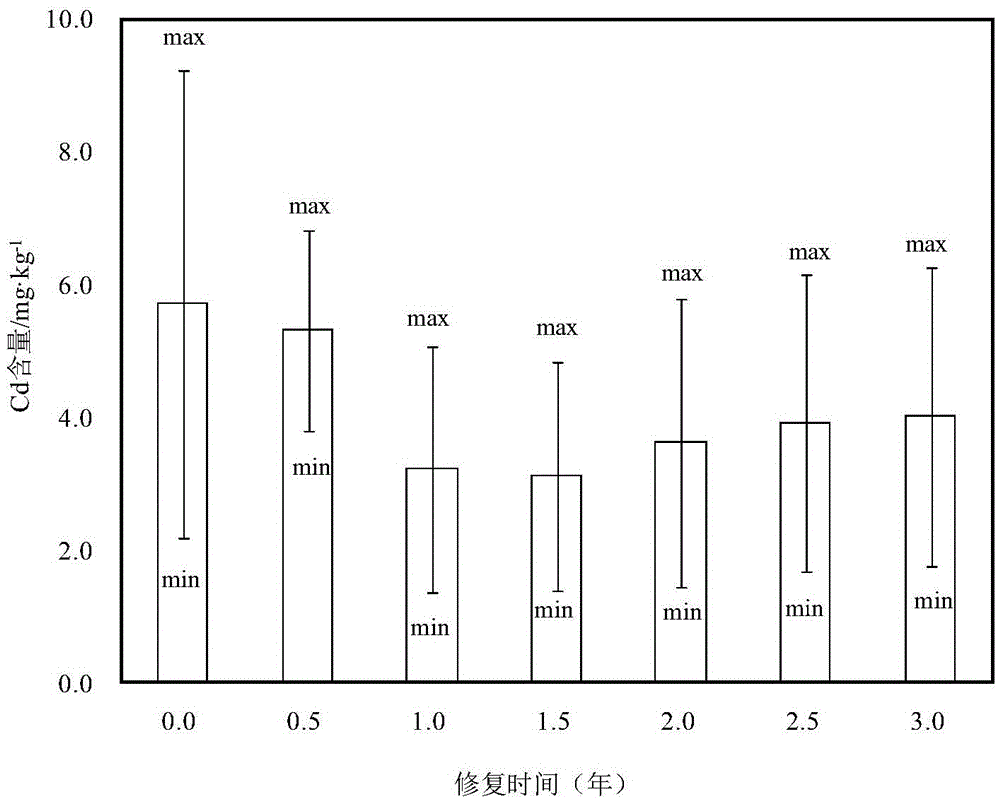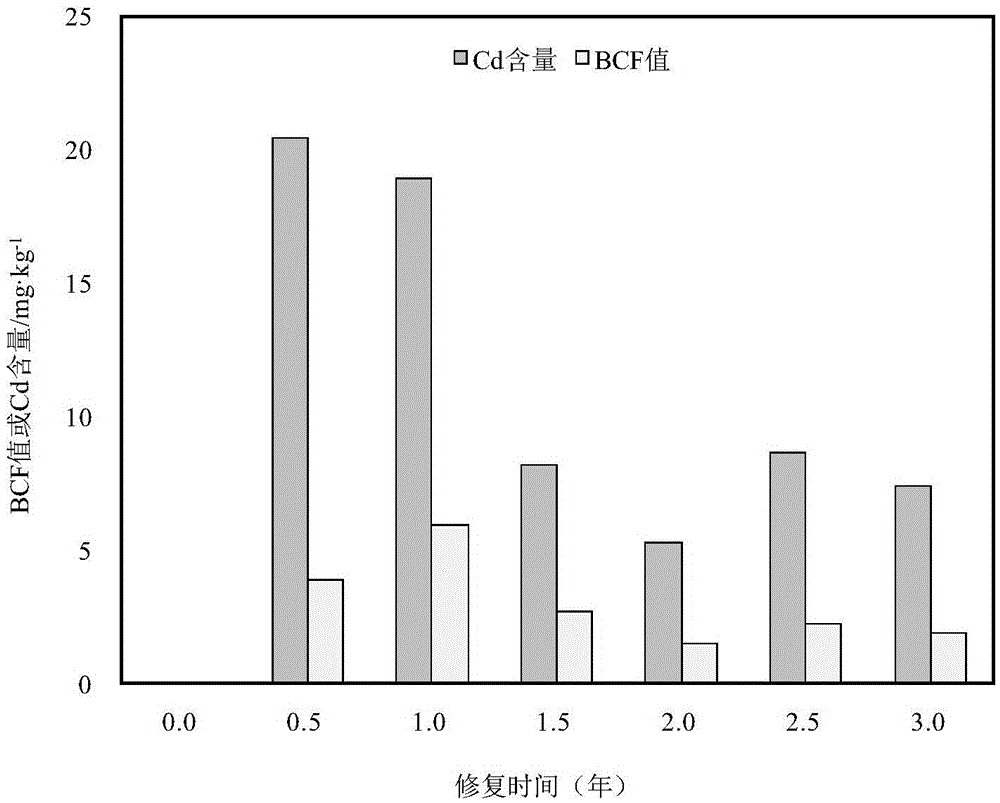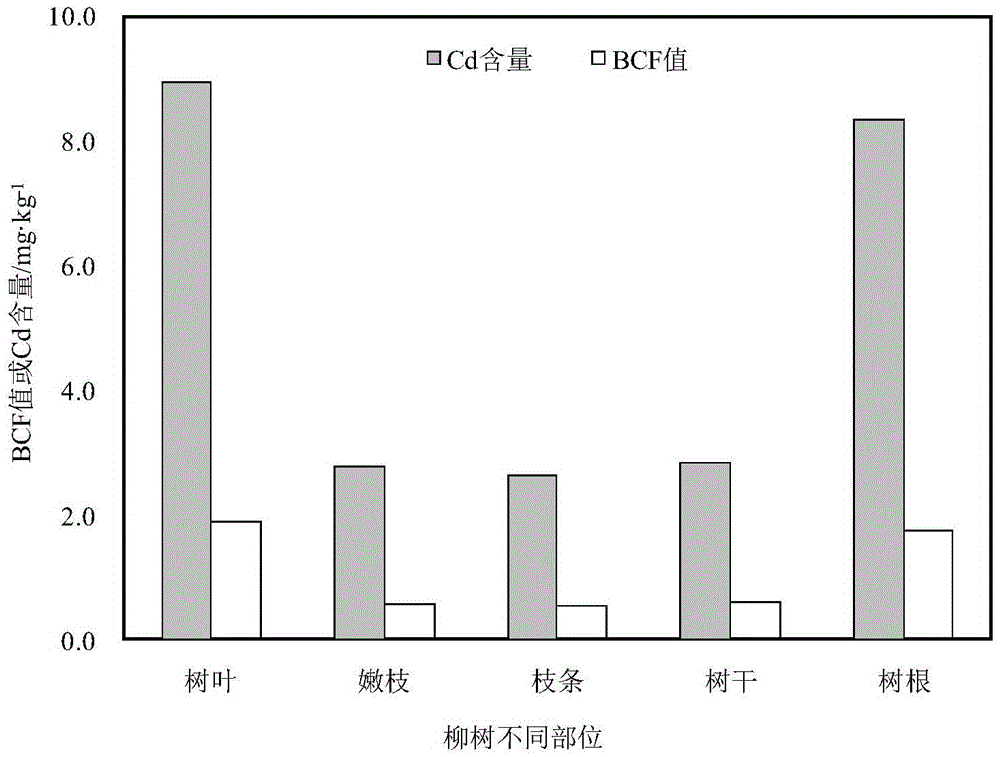Method for repairing farmland soil polluted by cadmium
A technology for cadmium pollution and soil, applied in the field of cadmium pollution soil remediation and treatment, can solve the problems of poor soil remediation technology, affecting farmland ecological environment, unable to continue farming, etc. Effect
- Summary
- Abstract
- Description
- Claims
- Application Information
AI Technical Summary
Problems solved by technology
Method used
Image
Examples
Embodiment 1
[0031] A method for repairing cadmium-contaminated farmland soil, comprising the following steps:
[0032] (1) Select a cadmium-contaminated farmland in Xishan District, Wuxi City, Jiangsu Province, with an area of 2.6 mu, measure the soil Cd content and its difference, the soil Cd distribution is uneven, the Cd content is between 4-13mg / kg, and the average Cd content more than 6.0mg / kg; Cd and other heavy metal pollutants are mainly concentrated in the soil between the surface and 20cm, and the surface soil not only has significantly higher Cd and Hg, but also has slight Zn enrichment and soil acidification; The land is 80 meters long and 22 meters wide (covering an area of about 2.6 acres) for sorting, renting machinery and labor to finely crush and level the soil at a depth of about 20cm or more, ditching and dividing ridges, and dividing them into 5 ridges according to the natural length of the field. Each ridge The ground is 80m long x 3.9m wide, and 1.2m drainage dit...
Embodiment 2
[0039] Same as Example 1, the difference is: in the selected cadmium polluted farmland in Example 1, choose half acre to plant weeping willows and other seedlings for comparison by common horticulture, and the results show that on the Cd polluted land of the same lot, the present invention There is a significant difference in the effect of absorbing soil Cd with other plants planted by common horticulture. Taking the leaves of the plant growth period of 1 year as an example, the Cd content in the leaves of Suliu 172 in the present invention is the highest, and the leaves of Suliu 172 absorb soil Cd. The bioconcentration factor BCF (BCF=leaf Cd concentration / soil Cd concentration) reaches 6.33 on average, which is much higher than other seedlings such as weeping willow and red maple planted by common horticulture. The comparison results are as follows: (see Table 1).
[0040] Table 1 Suliu 172 of the present invention, other nursery stock leaves, soil sample Cd content (mg / kg) a...
Embodiment 3
[0044] Same as Example 1, the difference is: in order to improve the processing effect of the present invention's method to cadmium-contaminated farmland soil, step (3) in the present embodiment is carried out to 1 year from the farmland soil and digs up the whole tree when the test is carried out Willows were replanted with Suliu 172 cuttings, and then removed after 1 year, and repeated 4 times to complete the restoration of cadmium-contaminated farmland soil. Although the removal and planting frequency of Suliu 172 is relatively high in this embodiment, it can also achieve a good restoration effect: the highest Cd content in the soil drops from 10.7mg / kg to 6.3mg / kg, and the maximum drop is close to 41%.
PUM
 Login to View More
Login to View More Abstract
Description
Claims
Application Information
 Login to View More
Login to View More - R&D
- Intellectual Property
- Life Sciences
- Materials
- Tech Scout
- Unparalleled Data Quality
- Higher Quality Content
- 60% Fewer Hallucinations
Browse by: Latest US Patents, China's latest patents, Technical Efficacy Thesaurus, Application Domain, Technology Topic, Popular Technical Reports.
© 2025 PatSnap. All rights reserved.Legal|Privacy policy|Modern Slavery Act Transparency Statement|Sitemap|About US| Contact US: help@patsnap.com



